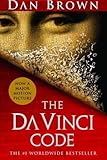The DaVinci Code (III of IV)
 The Da Vinci Code
The Da Vinci Code
by Dan Brown
So how’d we get here?
Remember the class I initially mentioned? Well, coupled with it was another one of similar intent, but focused on the New Testament. It was one of the readings of that class which caused me to have a small but fascinated revelation about the possible identity of the mysterious and unnamed “disciple he [Jesus] loved,” and I ended up writing a short paper on it.
In the paper I cheerfully and freely interpreted some Bible verses in order to postulate Mary Magdalene was that disciple. I enjoyed both the speculative nature of my interpretations, and the writing of the paper. I handed it in, the professors loved it, I got an excellent grade, and that, I believed, was that.
Except… it turns out it wasn’t. People were wide-eyed, fascinated, and mostly silent in class when the paper was read aloud. I received a few cautious, somewhat shocked emails from folks who’d read it on the web and thought it was a Very Bad Idea. A friend of the family who was an elderly English teacher and gentleman wrote me an amused letter congratulating me on the paper, and asking me if I’d written it simply because the idea had occurred to me, or if I’d thought to have fun stirring up trouble in class.
Er… thought to what?!
Why all the controversy?
Why did people have such strong emotional reactions to the very thought of Jesus perhaps caring more for a woman than for his other disciples? Why such horror at the possibility women might not be the supposedly divinely ordained slaves of men, put on earth to be dominated and abused by him just as he dominates and abuses animals? -that she might, in fact, be an equal — or even more?
No one yet has had an answer for that question for me. Most folks just laugh nervously and shrug it off, or patronizingly / angrily / irritatedly denounce the feminists who’re supposedly destabilizing society by asking such supposedly pointless questions.
Why the avoidance? What’s wrong with thinking and questioning your own personal beliefs? -unless on some level you know you’re wrong, and you fear admitting to what you see as weakness?
For that matter, why the anger and shock at the very concept of Jesus perhaps not being as pure as the driven snow — that he might be the Son of Man as well as the Son of God? That is how he was initially referred to, after all. What’s so bad about that?
This is the issue most folks seem to focus on, but I wonder. Is it that, or is it the fear of women being seen as equals which drives the furor I’ve seen?
I don’t know. I do know there’s a sadly sizable contingent of folks who react violently to any new idea; who seem to consider any challenge (however mild) to their deeply cherished beliefs as vicious attacks on their person. I think I saw a very mild form of this, and I believe this is what is causing the highly emotional backlash against Brown’s pleasant little mystery.
I don’t personally care if Jesus was divine or not, any more than I care if Buddha or Mohammed was. They’ve all been dead for millennia. What I care about is how we treat each other now, and if current religious thought says we should abuse some group of folks because some deity said so, then I think we need to either re-write, re-interpret, or dump that particular sickness.
Almost all the religions I know of started out with someone (usually a radical for that time) saying we should be kind to each other, and treat each other well.
It’s only after the degenerative influence of millennia of fear- and hate-filled teachings by power-hungry men that we end up with the viciousness, institutionalized cruelties, and religiously sanctioned abuses we currently label “religious thought.”